“I still get abuse and I know I’ll still get it because I’m a woman”: the uphill struggle for female sports broadcasters
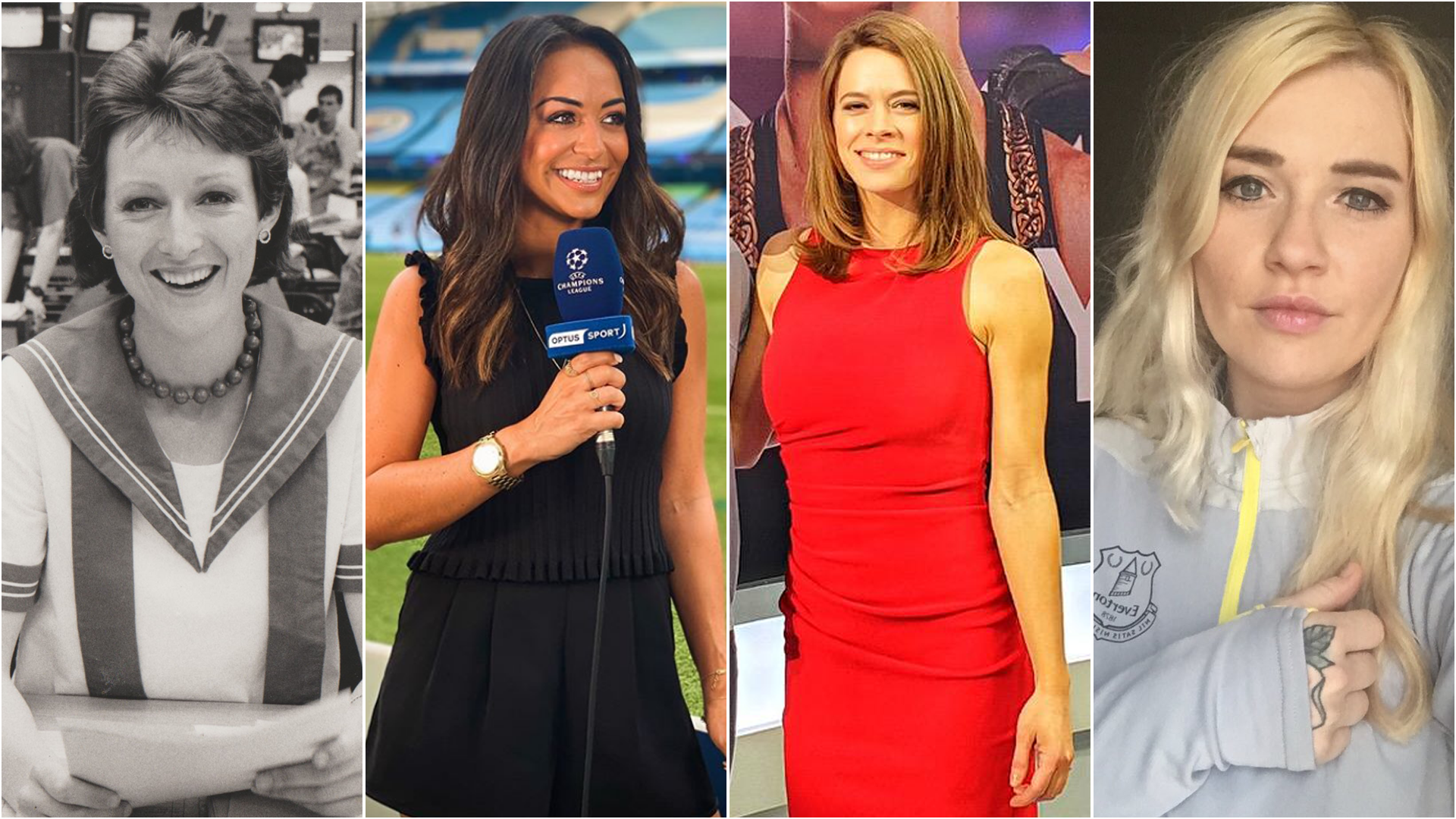
Still to this day, female journalists and broadcasters face an uphill battle for equality as the shadow of online and workplace sexism refuses to subside.
Even though talented women like Alex Scott and Laura Woods are given high-profile opportunities on sports desks, panel shows and podcasts across the country, the fight for acceptance and fair criticism still goes on.
🗣 "She's one of the best pundits I've ever worked with. All you see on Twitter & Instagram is what is a woman doing working in mens football. She knows football inside and out more than most people"@MicahRichards speaking the truth about @AlexScott 👏 pic.twitter.com/3q4H9M5f9H
— Football Daily (@footballdaily) September 21, 2020
No football fan is a stranger to the repetitive, predictable outcry which dominates social media when a female is linked with prominent role; sexist abuse and calls of “political correctness gone mad” drown out any debate on the points they make.
Accusations of a lack of knowledge, credentials and positive discrimination still rear their ugly head – even in 2020.
Some of these opinions are reminiscent of those commonplace in the 1980s and 1990s, but despite a supposed more equal society, female broadcasters still get unfairly challenged when they make a mistake.
BT Sport broadcaster and Football Ramble podcast host Jules Breach knows this backlash all too well.
On BT Sport Score in 2018, she accidently celebrated a replay of Glenn Murray scoring for her beloved Brighton & Hove Albion.
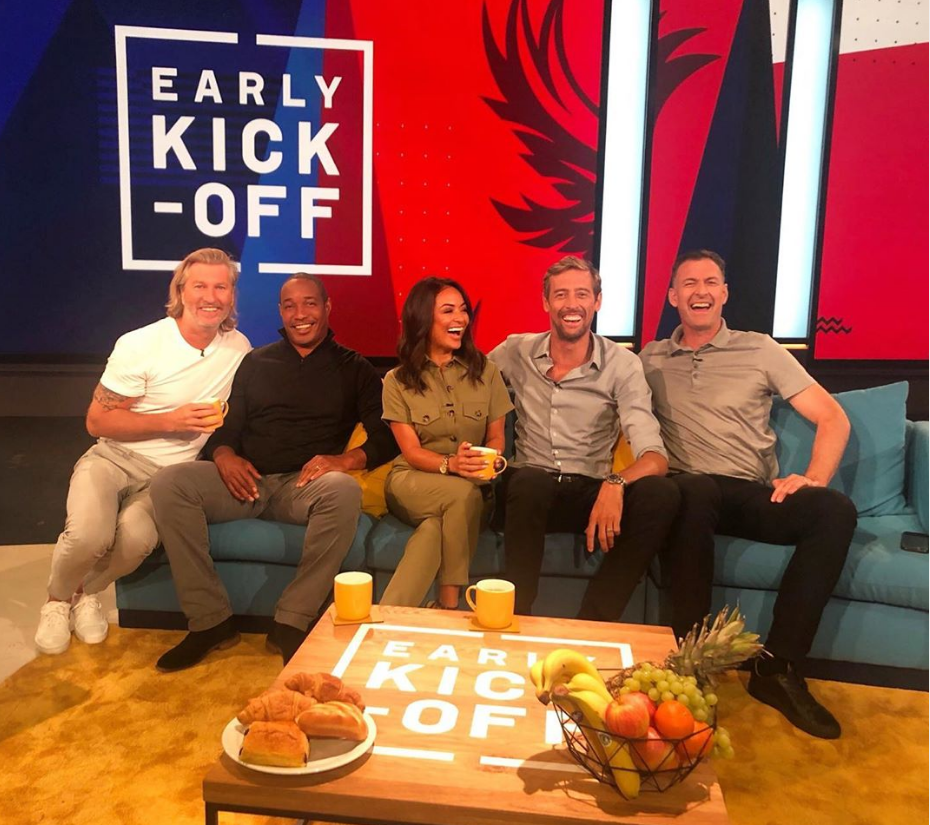
Jules Breach on BT Sport's Early Kick Off show.
Jules Breach on BT Sport's Early Kick Off show.
She thought nothing of it at the time, but after the clip was released on Twitter, she received a torrent of abuse, with some saying it was proof that women shouldn’t be in football.
Jules said she dismissed these comments but admitted they were frustrating and disheartening.
“I don’t sit and cry about people writing messages like that, because they’re just ignorant, stupid and ill-informed” she said.
Addressing those who doubt her because of her gender, she said: “Why don’t you open your mind, there’s obviously a reason why people think that, possibly because all they’ve ever known is men working in football.
“I know how hard I work and how passionate I am about football.
“I guess it is a bit disheartening that some people still think that way, because most girls I know in football deserve to be there and they should be taken just as seriously as their male colleagues.
“We all expect criticism because of the public work we do, it’s part of our job, but it’s frustrating when that criticism is based on our gender and not actually the facts.”
What hurt Jules more was how her being a woman was emphasised and singled out as the reason for her mistake, while her male colleagues are not criticised in the same way.
Jules Breach talking about the BT Sport replay incident.
Jules Breach talking about the BT Sport replay incident.
This precedent of treating women in sport differently is unfortunately not a new concept.
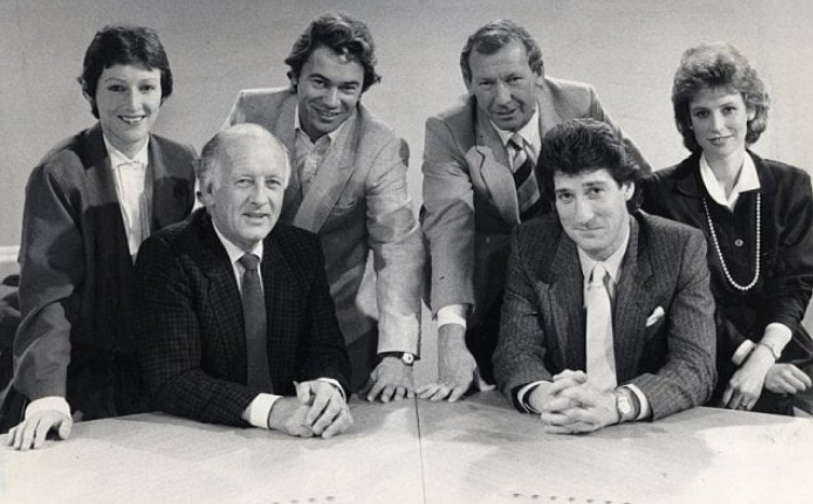
The BBC Breakfast lineup in 1986. Credit: Daily Telegraph.
The BBC Breakfast lineup in 1986. Credit: Daily Telegraph.
Sally Jones became the first female network sports anchor on BBC Breakfast in 1986, after being headhunted when she was presenting at Central TV in Birmingham and writing the women’s sport column in the Today newspaper.
Sally said although she found the publicity daunting, she had the personality to deal with the inevitable criticism.
“I have always had what my mum calls a high ‘Bugger it!’ factor and I am quite defiant and rebellious if I’m told I can’t do something” she said.
“I had little respect for most of the people who criticised me, many were male journalists fearing that a woman might encroach on their own coveted fiefdoms and take work away from them.”
The headlines of the day debated if a woman talking about sport could be taken seriously, as their inclusion was largely unprecedented.
Sally was in the lime-light from day one; being tested constantly about her knowledge of numerous sports and appearing in several photo shoots.
Fans sent her complaints in their droves – with one disgruntled rugby fan in Castleford questioning how a “slip o’lass” could know anything about rugby league.
The pressure on her was relentless but Sally accepted it as part of the job.
She said: “They asked a lot of questions to put me on the spot, kind of how the chancellor of the exchequer always gets asked about the average price of milk. I had to have a quiz mentality and make myself learn anything that they could ask me.
“I would try not to get frustrated if they treated me as just the token female sports anchor, I usually deflected it with humour.
“It was difficult to break through that barrier, but I just had to get my head down and keep pushing.”
Sally also had to adapt to an environment where her employer focused on who she was and what she looked like, rather than her broadcasting ability.
Sally said Des Lynam and Frank Bough were friendly faces and she could confide in other women in sports production – who were fighting for acceptance as well – but at times, she felt like she lacked professional guidance.
She said: “When I was starting out, your sociability and looks were terribly important if you wanted to go far in the industry.
“I never felt I had a particular mentor or anyone within the BBC who was looking out for me, which can engender self-doubt and a sense that you don’t want to be there.
“The BBC liked the amount of profile and attention I brought to the show, as they did with Helen Rollason when she was appointed to Grandstand, but they did not take great steps to help us do a good job or give us the encouragement that would have made us feel like we ‘owned’ our roles.”
Even without direct support, Sally thrived in a tough presenting environment, presenting the Olympics in 1988 and 1992, as well as the NBA and women's golf.
With the BBC keen to capitalise on the increased publicity from using female broadcasters, Helen Rollason and Sue Barker both got the opportunity to host the BBC flagship show Grandstand; considered one of the more challenging shows to present at the time, as it covered multiple sports at once and changed very quickly.
Sally said Grandstand was like a marathon every Saturday and the running order was “usually out of the window” halfway through.
Both women received intense scrutiny over small mistakes – especially Sue Barker – who received a visceral outcry after she confused Queens Park and Queens Park Rangers.
Sally said the response was bedlam: “People in pubs and newspapers across the country went absolutely mad.
“Letters flooded in saying how terrible it was and that she shouldn’t host Grandstand ever again. That was all caused by one tiny mistake in four to five hours of hosting.”
Helen Rollason became the first women to host the show when she briefly filled in for legendary broadcaster Des Lynam but was replaced after a few episodes.
Sally said Helen’s confidence was demolished afterwards and was repeatedly told she was inept at her job.
“She was deeply ashamed to be taken off, even though she wasn’t eased into the role and fully supported” she said.
“Professionally, she was pitchforked in due to the publicity the BBC would get. At the time, they milked any publicity they could get.”
Despite setbacks and constant criticism, all three women went on to have successful careers and slowly gained more acceptance – paving the way for talented female broadcasters that succeeded them.
Sally advised younger broadcasters not to take notice of people “who couldn’t write or present their way out of a paper bag.”
A lot of progress has been made since Sally was broadcasting, but one aspect of her journey remains particularly relevant.
Female broadcasters are still being unfairly picked apart for their mistakes compared to men, and these slipups are used as a catalyst for discrimination.
“"If we made the slightest slip, though, chauvinist critics had a field day, concluding that all women must be useless sports presenters.” Sally Jones - Daily Telegraph
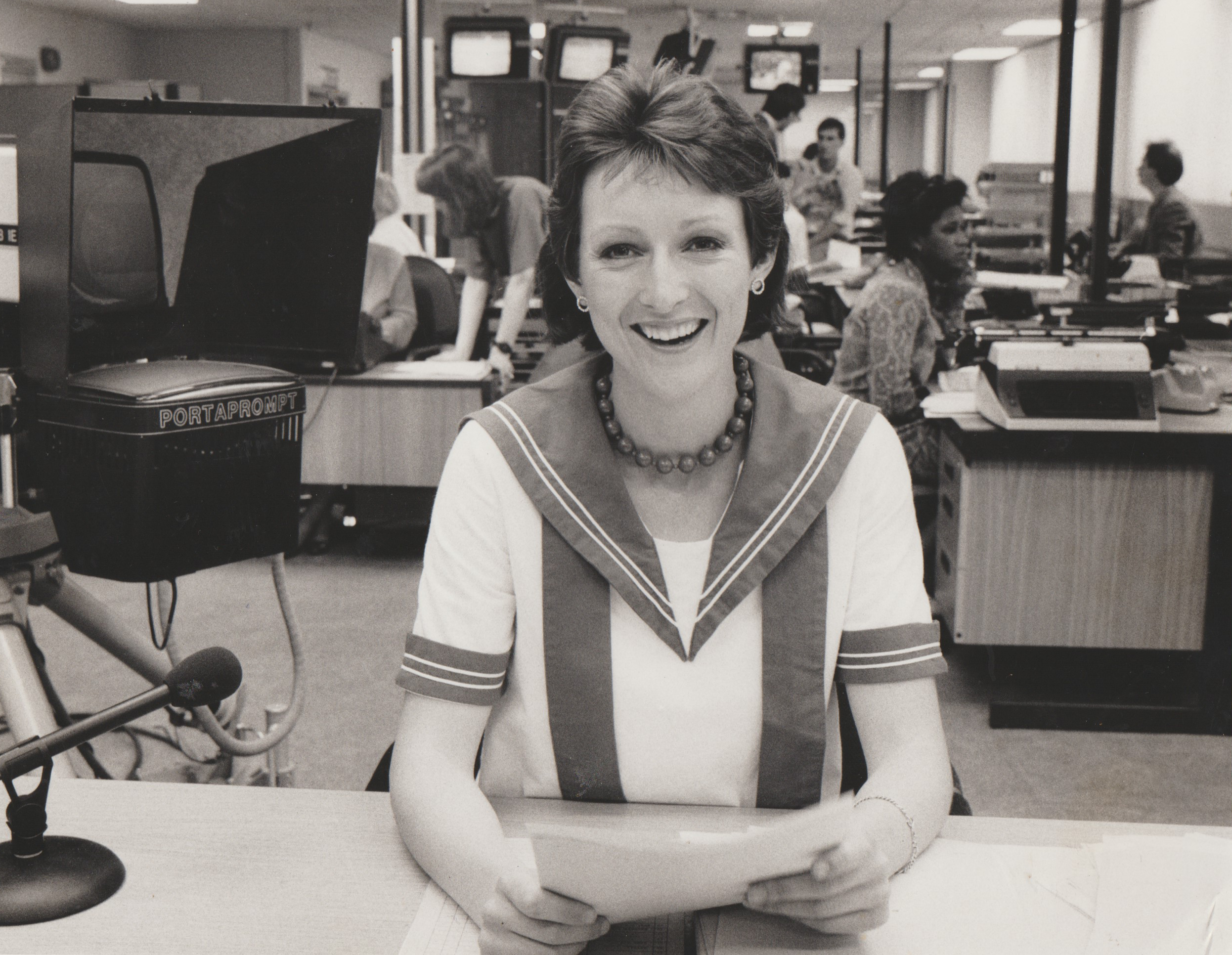
The response to Sue Barker’s Queens Park blunder is eerily similar to Jules Breach’s replay celebration, despite these incidents being decades apart.
Jules acknowledges she’s had to deal with sexism in her career.
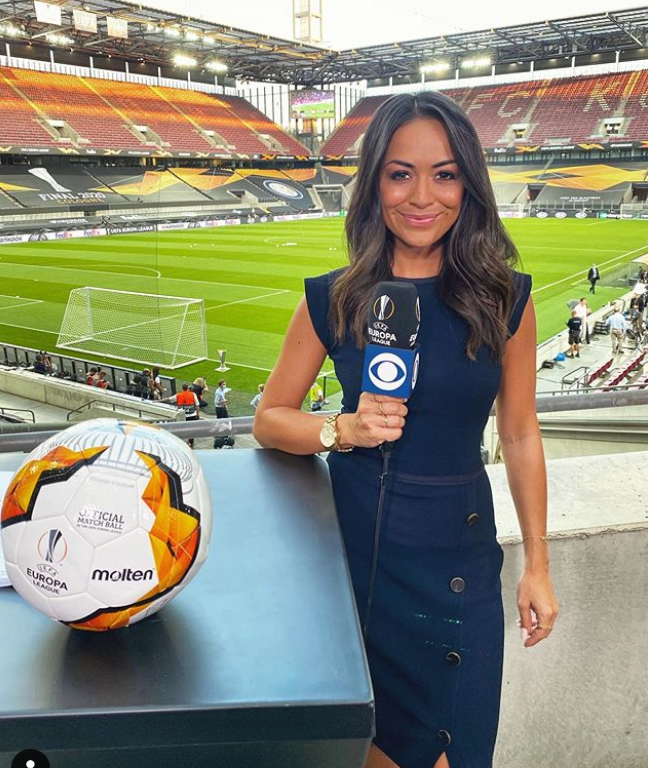
Jules Breach broadcasting the Europa League for CBS.
Jules Breach broadcasting the Europa League for CBS.
“I have experienced sexism” she said. “More so on social media than anything else, but in the workplace, you do get treated slightly differently.
“I have to be told I have to look a certain way and dress a certain way so my image doesn’t get taken in the wrong way.
“That’s really difficult because my image is just part of me, that doesn’t mean because I look a certain way, I don’t have the knowledge in my head.
“Why should I be taken a certain way because of how I dress, or how I do my makeup or hair. It seems crazy to me.
“But I think that’s more of a societal and audience issue, rather than an employer issue.
“They are just looking out for their staff and want the viewers to see you for who you are rather than what some people see externally, which might be a glamorous girl where some question ‘How could she possibly know about football’.”
Jules has had a love of football since she was a teenager growing up in a sports fanatic family.
But even with this passion and a desire to pursue a media career - graduating from the University of Sussex - she decided to initially ignore roles in sport, thinking the industry was not open to her and that her applications would not be taken seriously because of her gender, age and race.
“When I graduated, there weren’t really many females who worked in sport, and specifically not in football, who were what I thought I was.” she said.
“I come from a mix-raced background and I was a lot younger, so there were all sorts of reasons why I couldn’t identify with anyone specifically and think ‘That’s who I want to be like’.”
“For me, it was all about hoping that someone would believe in me, would like the energy and passion I bring and hope that one day it would work. For that reason, I didn’t pursue a career in football straight away.”
After slowly building up her confidence by presenting on shopping channels and entertainment shows, her perseverance paid off and she got the opportunities she hoped for: first covering Brighton for Latest TV and Juice 107.2, then broadcasting on BT Sport Score, covering the 2018 World Cup for Optus Australia and hosting the popular Football Ramble podcast.
More and more roles have became available for ambitious women to cover the men’s and growing women’s game.
Jules said positive change for women is happening, but there is still a long way to go.
“I think you only have to watch football to know that it’s definitely changed” she said.
“There are so many females, of all ages, that now work in football on all sorts of programmes.
“There’s still a lot of work to do of course. There should always be more diversity and gender balance when needed.
“But I definitely think there has been a move from what we used to see as females working in football to now.”
Despite women generally being more accepted figures on TV and radio, they are still seen by a minority as outsiders, who will take any chance to dismiss them.
The BT Sport Score incident is a case in point: a mistake any pundit could make but gender is always brought up when a woman makes a blunder.
Jules was embarrassed by the incident but refuses to let sexists turn a blooper into an attack on her identity.
“It was embarrassing because it’s embarrassing, not because I’m a girl” she said.
“The funny thing is Robbie Savage has done it and so has Chris Sutton. The other pundits have all celebrated goals that were replays and the type of stuff you see written to them is very different to what was written to me.
“People need to understand that just because we’re a different gender, and you may have been used to it just being talked about by men, that football is a sport for everyone.”
Jules Breach on the Women In Football study about workplace sexism.
Jules Breach on the Women In Football study about workplace sexism.
Jules has also had to adapt to other pundits, sometimes ex-players, who turn up unprepared and give little dedication to the job.
“When you have a pundit who turns up unprepared, it’s really annoying” she said.
“You have to structure you’re questions around what you know they know, or what you think they know.
“You should come to your job, regardless of gender – whether you have played at that level or not – fully researched and prepared for it. Otherwise you don’t deserve to be there.”
Jules is not the only high-profile broadcaster to deal with misogyny on social media.
Current Sky Sports News and Football Ramble presenter Kate Mason has had to battle with sexism and self-doubt to succeed in her career.
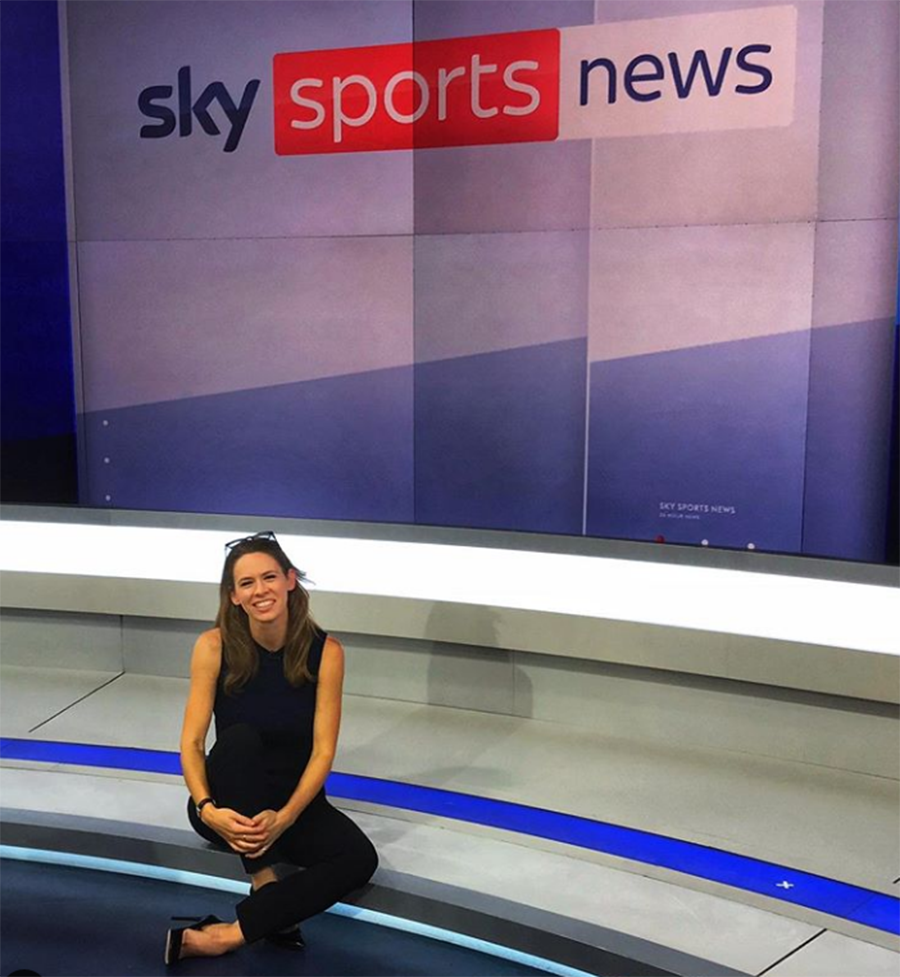
Kate Mason presenting on Sky Sports.
Kate Mason presenting on Sky Sports.
"It’s still very much going on” she said.
“Sometimes it’s just as basic as people saying to me they don’t want a female voice on football shows because it doesn’t sound right, so it isn’t something I can change.
“I am female, and although it may not be the norm for some people, it is the norm for me and I want to do this.
“I love football and it’s weird to be told about something which is beyond my control.”
Kate was inspired to become a broadcaster while studying at Cambridge University, after seeing Jacqui Oatley commentate on Match of the Day and fellow Cambridge graduate Clare Balding working at the London 2012 Olympics.
Seeing more women on TV and growing up with a ‘you can do anything’ family motivated her despite being aware that being a girl is sometimes not considered the norm.
Gender is no longer considered a barrier by employers, but for some football fans, it’s a reason to dismiss a broadcaster altogether.
Kate describes it as how you would treat a teacher you decided didn’t know anything.
She said: “You could say the most brilliant thing in the world and they won’t take it in, dismissing everything you say.
“Unfortunately, you have to develop resilience. Sometimes on social media I’ve had to deal with one person saying something, then getting all their mates to join in and it’s particularly bad in football.”
Throughout her career, Kate has had to deal with the ups and downs of social media.
When she was announced as a new Football Ramble podcast host, she received an outpouring of support, but has also had to handle negativity while working for Sky Sports.
At one point, a group of Everton fans insulted her on Twitter for smiling while talking about a result.
She said: “If someone decides you’ve insulted their football club, that’s it, even if it’s something small.
“I saw a clip of me smiling when reading out an Everton loss and saw abusive messages such as ‘why does this ugly bitch hate Everton so much’.
“I try not to think about it too much because otherwise you question reality and think this is mad, how are people doing this?
“You have to just try and dismiss it, reassuring myself that I know what I’m doing.
“Even if I didn’t achieve what I wanted that day, or thought I could have done better, those thoughts shouldn’t be controlled by what someone on twitter says.”
So appreciate Sky trying to bring this more into the open. Is it moronic of me to be surprised that a lot of the responses to the post are... abusive? Love to anyone suffering out there 💔x https://t.co/qsXk3t9xN9
— Kate Mason (@kvlmason) October 1, 2020
The toxic environment for women working in football will be one that will be hard to challenge.
Kate said her dream for the industry is for anyone to feel welcome and work in or engage with sport if they wished.
There is a long way to go for this to happen.
In 2018, the professional network Women In Football reported they saw an increase of almost 400% of reports of sexual discrimination and harassment.
The largest increase was expectedly on social media, but the data shows workplace sexism is by no means a thing of the past.
Another report showed 72% of men didn’t see any inequality despite complaints.
This situation has only been exacerbated by the Covid-19 pandemic, with a report by the network being described as a “cry for help” by those in the football industry.
Three quarters of the women said they were treated differently to their male colleagues because of childcare, workplace ‘lad culture’ and pay cuts across broadcasters, football clubs and newspapers.
Jules was not shocked by the findings and said a more diverse workplace is the only solution.
“I have friends who work in football who have similar jobs and we all share stories and talk about how we’re treated at certain places.
“Sometimes there is no sexism at all, and it’s great when you get treated equally.
“But there are a lot occasions where we aren’t and it’s definitely something that needs to be improved and can only be improved the more females we see working in the industry.”
Diversity in the workplace and supporting female professionals are the main aims of Women In Football.
Ex-professional female referee Janie Frampton – the second ever woman to officiate men’s football – has been a network ambassador for ten years, after being supported when she got sacked by the FA.
Their membership has grown exponentially since Janie began working with them and she believes women have to be employed at board level to truly root out misogyny.
She said: “The biggest problem is women not being represented at the highest levels of decision making. Those decisions are predominantly made by older white men.
“They have a non-conscious bias, because it’s natural to appoint people who are similar to you and think along the same lines, so there is a desperate need for a gender and colour balance. Those sorts of things are not thought about.
“A lot of men empathise and do the best they can, but if they haven’t walked in my shoes, or in the shoes of a women, person of colour or someone from a lower social class background, then they simply do not know what it’s like.”
The main difference from forty years ago is women are no longer accepting of workplace sexism being dismissed as ‘banter’.
Despite this change, in Women In Football's most recent survey, only 12% of over 4,000 women actually reported discrimination in the workplace.
Janie is reassured by women feeling more comfortable speaking out but is worried ‘lad culture’ will remain due to the issue often being brushed under the carpet.
“It’s a good thing more women are now confident enough to report misogyny” she said.
“But it is a shame lad culture is still in the workplace and bringing down so many fantastic women. They shouldn’t have to deal with this.
“Women can be their own barriers – due to low self-confidence and being in a male dominated industry – but now they know they can be supported.
“From my experience, sexist behaviour was not taken seriously when reported internally and many women weren’t satisfied.
“Laddish culture still exists and everything is just passed off as banter, so when a comment crosses the line, some men don’t understand it.”
Dissenting football fans often complain about positive discrimination whenever a female broadcaster is employed, boiling down their role to a political statement.
Janie said employers should still look at the best candidates but more on-screen women are necessary to develop role models.
She said: “At the moment, positive discrimination is simply used to defend non-conscious bias.
“If you can’t see it you can’t be it, women and ethnic minorities need role models.
“You still look at the best candidates, but if somewhere needs more diversity, then you go with diversity.”
Now more than ever, a minority of disgruntled fans want to dig their heels in and shut women out of football.
A study published in the 2020 Sociology of Sport Journal analysed the opinions of football fans on the involvement of women in the game as broadcasters, journalists, fans, board members and referees.
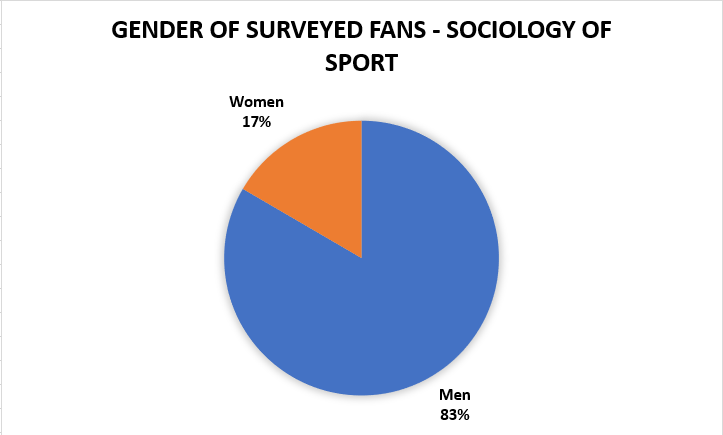
Sociology of Sport journal survey - gender breakdown.
Sociology of Sport journal survey - gender breakdown.
The authors surveyed 2347 football fans anonymously between 2015/2016 to gauge their opinions.
They concluded that even though there are more progressive attitudes towards women in men’s football, opposition still remained due to a perceived threat to fan culture.
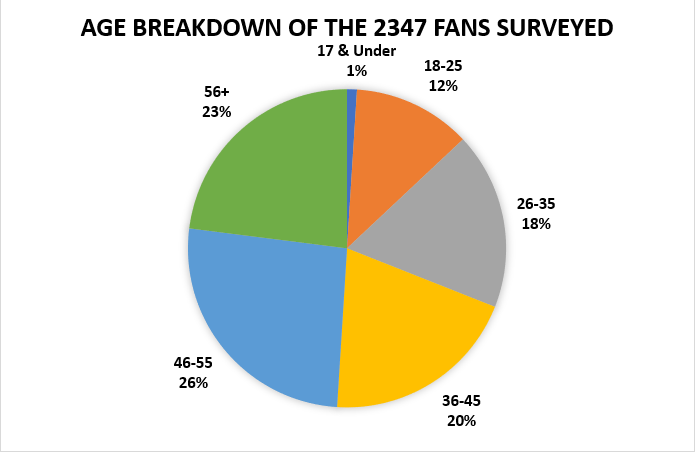
Sociology of Sport Journal - age breakdown.
Sociology of Sport Journal - age breakdown.
Co-author and sociologist at the University of Leicester, John Williams, thinks some white male football fans feel their domain is under attack by including women and ethnic minorities.
“Women are much more visible now in men’s sport and it’s a sign of positive change” he said.
“But there is also insecurity and resistance from some men.
“I’m disappointed but not surprised female broadcasters still face barriers towards being involved in men’s football.
“Football has for a long time been seen as a protected domain so we might expect a backlash.”
“If the feminazis don’t like male football culture then they should fuck off and go and fuck themselves and each other,” male Cardiff City fan, 46-55 years old .
“Sexism should be more severe. Women have no place in football,” male Aberdeen fan, 36-45 years old.
Anonymous football fans from the 2020 Sociology of Sport Journal study by Jamie Cleland, Dr Stacey Pope and John Williams.
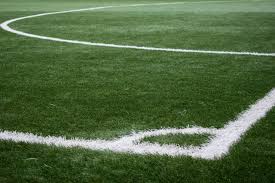
Not every fan agrees but social media does make the voices of extremists more pronounced.
The majority of fans assume sexism is merely a generational problem, but Dr Stacey Pope, co-author and Associate Professor at the University of Durham, said sexist opinions will not age out.
“In the academic studies, there was no clean split between young and older people having those viewpoints” she said.
“Many younger fans are afraid of football being feminised, so the idea that it’s just a generational problem is unrealistic.”
"Sexism is more of an issue because of attitude rather than governance. There are no sexist practices in football (i.e., women can’t apply for certain jobs), but there is an underlying attitude among those in the footballing world that it's a man’s world which doesn’t exist in other sports, nor other countries,” female Manchester United fan, 18-25 years old.
“I’d suggest that anyone who denies the fact that sexism and misogyny are still rife in football has their head in the sand. In this way, the sport reflects wider society, but it is perhaps magnified in football because of how male-dominated the sport is and how the “boys club” mentality seems to have hung around so long,” male Celtic fan, 26-35 years old.
Anonymous football fans from the 2020 Sociology of Sport Journal study by Jamie Cleland, Dr Stacey Pope and John Williams.
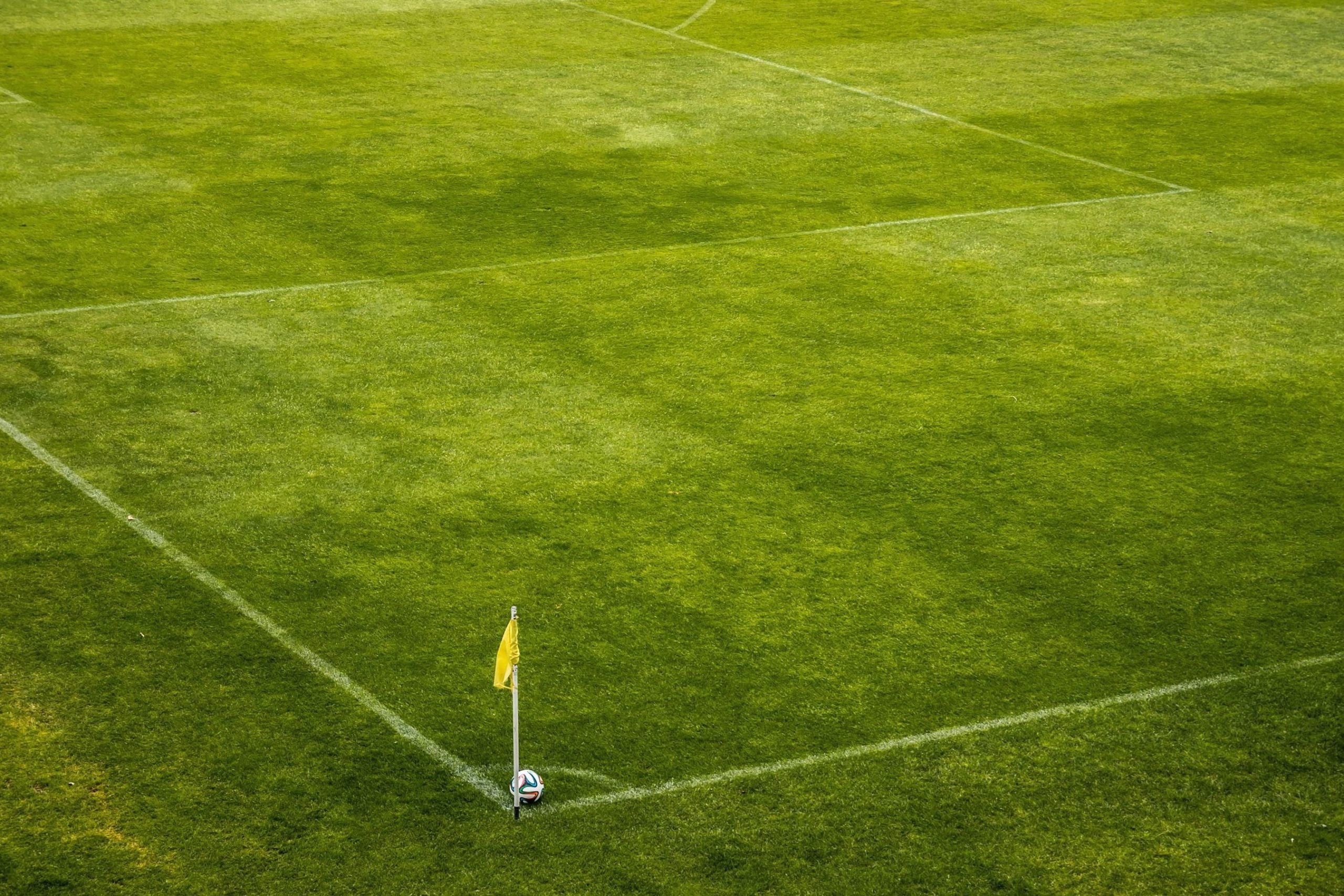
Generic statements such as ‘I don’t want politics in football’ are used to dismiss any attempt by the sport or broadcast companies to use their platform for social change in football.
John Williams said these opinions are inevitable and hard to change.
“Some think sport stands outside of politics rather than being constituted by it” he said.
“They see sport as somehow ‘pure’ and unsullied by external inequalities and processes.
“It is a comfort to feel this way but it is obviously misguided.”
One of the worrying survey conclusions was even though the majority of participants found sexism abhorrent, they remain neutral through not challenging it.
Stacey Pope said the only solution is to keep women visible on TV and encourage others to call out misogyny when they see it.
“The only way we can change these ideas is though visibility” she said.
“People’s attitudes towards women’s football changed when it was shown more on the BBC in 2015, it changed a lot of minds.
“If that can happen, it can for broadcasters as well. The numbers create a more natural environment.”
Broadcast companies have gone on to support this visibility by putting deserving talents on screen and even publicly challenging abuse hurled at them.
Rachel Brown-Finnis became one of the first female pundits on BT Sport’s Premier League Tonight on 9 February 2018.
She has played at the highest level of women’s football and was capped 82 times for England, yet to some, she was not qualified to give her views on the sport she’s played for 16 years.
Throughout the game, BT received several tweets condemning her appearance on the show as a publicity stunt.
In response, the entire panel challenged the criticism live on air and argued Rachel was there on merit.
Jules was deeply saddened by Rachel having to defend herself and her credentials.
She said: “I was really emotional about it at the time. I remember thinking this is as equally amazing that it is being spoken of, as it is upsetting that a friend of mine had to go through this.”
Fans were also angry about the host Jake Humphrey not being an objective ‘traditional’ host.
Stacey Pope defended BT Sport’s handling of the situation and Jake Humphrey as it publicly supported Rachel’s right to be a pundit.
“Everyone is entitled to their opinion but a host cannot sit on the fence when these issues are brought up” she said.
“Jake was right to challenge negative views on women being in sport and it’s unrealistic to say issues in society should not be brought up in conversations about football.
“You can’t tell me everyone has to have experienced premier league football to comment on it.
“Innate knowledge isn’t everything, and I think it’s unfair that Rachel’s knowledge of the game as an international is being questioned, and that she - like many women in football - are pressured into demonstrating their knowledge of the game.”
Comparing the careers of the pioneer broadcasters and the established figures today can paint a bleak picture.
Yes, women are given excellent opportunities which those in the 1980s could barely dream of, and successful women like Jules and Kate have gone on to have fantastic careers.
But is it fair that they have to deal with sexist abuse and constantly defend their right to be working in sport?
Kate said even though it was important to have difficult conversations, like one on the Football Ramble where she and co-hosts – Vithushan Ehantharajah and Luke Moore – discussed online sexist and racist abuse, she said it can be exhausting to re-surface those experiences.
👋🏼👋🏼👋🏼 https://t.co/TNQOaQ7Hno pic.twitter.com/xSzDFn9iGl
— Kate Mason (@kvlmason) July 15, 2020
“I think we were trying to reach out to people and share the experiences that are important to talk about” she explained.
“With the BLM movement, a lot of my black colleagues were asked to talk about their experiences and they felt like it was really exhausting afterwards, and even though my experiences of sexism were different, I felt a similar way.
“I think it’s because of the sense that you want to say something and you want to say it right, you want to help in some way.”
Sexism or the fear of it can affect careers, whether it’s targeted at an established broadcaster or someone getting their first break in the industry, damaging their self-confidence and ability to do their job.
One woman who has overcome sexist abuse and a myriad of other issues is Sarah Halpin, broadcaster for Everton's Men's and Women's teams.
What a day! Presented the 1st ever ‘Everton live’ the brand new pre match show at Goodison Park with @_Wolfenden & @1kevincampbell . Absolute privilege! What a game, DCL hat-trick, Goodison debut & 1st goal for #James. 👏 Without fans feels rubbish. But great win! UTT! #EFC pic.twitter.com/7XPtYJ8DVB
— Sarah Halpin (@SarahHalpin9) September 19, 2020
Despite Sarah saying football is “part of her DNA”, she never thought she would become a broadcaster because of her struggles with alcohol addiction and mental health.
“I never anticipated or thought about being a broadcaster” she said.
“I didn’t think it was something I’d be good at; I was just a fan who understood the game and was obsessed with it.
“I struggled massively with alcohol addiction and there was a large space in my life where I just drifted away from everything.
“I didn’t go to university and do the many things I wish I did because my life was spiralling out of control with these addictions and mental health problems I was facing.”
Sarah gave up alcohol four years ago, after her addictions almost destroyed her.
After one infamous weekend in Blackpool – where Sarah thought she would end up dead, in hospital or in prison – she enrolled with Alcoholics Anonymous and has been sober since.
Before and after the recovery, addiction deteriorated Sarah’s mental health, sometimes causing her to be unable to get out of bed altogether.
“I was bereft of anything” she said, “even when Everton were playing I would just pull the quilt over my head and cry.
“Going to watch Everton with my family was my favourite thing in the world, and I couldn’t even do that. It broke my family.”
Sarah could have given up at any time during this dark period.
But once she got back into a routine and returned to Goodison Park, her passion for football quickly soared into a broadcasting career.
She said: “When I started to feel more confident and happier, I went back to watch Everton regularly.
“I felt that zest for life reignite inside me and that’s when I started to be vocal with my opinions and it snowballed from there.
“I started going to watch the women properly again and there were no live post-match interviews, so I thought it would be cool to do that.
“Everton Women asked me if I wanted to start producing more content for them and it progressed from there.
“Sports channels then started contacting me as a pundit: I never expected it but I absolutely love it and feel extremely fortunate and grateful that I’m in a position to pave a career for myself in this industry.
“It stemmed from a raw passion and you can achieve things through hard work and having passion, that’s how I got here.”
With these new opportunities, Sarah felt she could control the self-doubt and mental health struggles she had.
Football gave her a platform for all the energy that had previously been burnt out by depression.
After covering the Women’s World Cup and Champions League final, all of Sarah’s hard work culminated into winning the Best Women’s Football Content Creator award.
🤯Can’t believe it! 🚂 back from the Etihad. Every one involved tonight is SO dedicated, so amazing! Hasn’t sunk in. & to be presented the award by @EniAlu wow! Thank you every single person for your support & love. I’m overwhelmed. Love you guys man! 💙 @TheFBAs #TheFBAs #efc pic.twitter.com/JWWMXt1nLU
— Sarah Halpin (@SarahHalpin9) May 9, 2019
Sarah said she will cherish the moment for the rest of her life.
“To get that physical award, something I can hold and see that says best women’s content creator judge’s choice, is a moment I’ll treasure until the day I die” she said.
“When you suffer with mental health you always struggle with self-doubt and feeling like you’re not good enough, you’re not willing to accept you’re good at something.
“For someone to say you’re good at this and you’ve got an award was amazing and the career highlight in my life so far.”
Sarah’s coming of age story is inspirational, but despite overcoming great challenges and becoming mentally stronger, she still struggles with sexist abuse.
She said she has to deal with it constantly on social media and it can drown out the support from Everton and her fans.
“I can take criticism, not everyone will like your stuff” she said.
“I’m loud, vocal and can be goby at times. I know there is going to be plenty of people who think I’m too much, and find me irritating and annoying, that’s fine, I can live with that.
“But people feel the need to have to tell you, and say it in a horrible way. There is no need for it!
“It gets to me still. I’m getting a little bit better but when it’s sexist and solely based on the fact of your gender, I can’t be dealing with that and I struggle to cope with it.”
Muting her Twitter notifications after radio pieces or shutting off the news when another female broadcaster is harassed are Sarah’s regular habits.
For her, social media is a double-edged sword: giving her a professional platform but also an opening for abuse.
She is adamant that social media companies have to do more to protect people.
“I don’t think in any other line of work you’d expect to be told you should be in a kitchen, or stick to this and know your place," she said.
“I think more can be done to protect people; I’d like to see that change.
“For now, it’s sad to say its part and parcel of the job. It shouldn’t be and I want to see that change. You have to hope it will eventually.”
Sarah Halpin discussing the time she got abused for appearing on an Everton fan YouTube channel.
Sarah Halpin discussing the time she got abused for appearing on an Everton fan YouTube channel.
When starting her career, Sarah was aware of potentially dealing with negativity, and as her prominence grew, the more hatred she received.
Sarah said she struggles at times with self-doubt, being singled out as a women and maintaining ambitious goals for herself due to misogynistic attacks online.
“I still get abuse, and I know I’ll still get it because I’m a woman and it’s not biting back that I struggle with” she said.
“I’m nowhere near the level of these high-profile women, so for me to have had these horrible experiences already, I can only imagine what it’s like for them and that concerns me.
“Obviously, I still want to be more successful and strive to be better, but the grief that comes with that is a worry.
“It put me off to an extent and it’s a shame people still say abuse is part and parcel of the job and you can’t have the good without the bad.
“That’s really sad and it affects me, but I keep going and putting the content out there.
“If I’m in a weak state of mind, I make a conscious effort not to put a video out that day, because one bad comment can make things ten times worse and it’ll take me longer to get out of a mental rut that I may be in.
“But I still try not to let it stop me from doing what I love.”
The impact of sexism on females in football should be obvious to anyone and it is still a hurdle for aspiring broadcasters.
The majority of employers are making excellent steps towards gender equality, protecting their employees and challenging the vitriol through promoting female broadcasting and challenging discrimination.
Yet some people will still only see gender and not talented human beings, but in order for this unfair treatment to end, misogyny has to be challenged in order to encourage more young girls to live their dreams in football.
Sarah said even though she’s gone through these negative experiences, she wouldn’t trade in her career.
“The reality of what I’m doing is great, I’m getting to work with the football club I love in something I’m super passionate about.
“If you’ve got that passion please pursue it. Football needs people who genuinely want to be there and have a love for it.
“I wouldn’t swap it, and all we can do is hope for a better future and try to make things better by our actions.
“The best way to stick it to these people who don’t want to see you do well is to continue to do what you do.
“Don’t let their negativity dim your light and you’ll move onto bigger and better things.”
